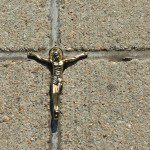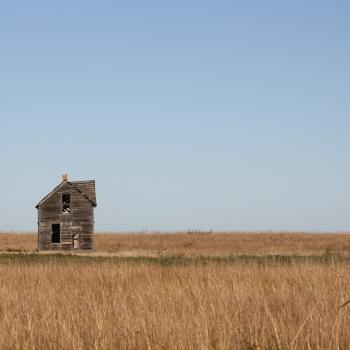
In another time in another country, a man I know came upon a washed out road while driving along the coast. Water running down the mountain and over the asphalt had made the road impassable. Just. There were some local guys standing on the edge. They would walk along with cars, guide them past the worst sinkholes, and at precisely the right time, wrap their fingers under the lower edge of the car and give it just enough lift to get through the current (like I said: another time in another country). They would do this for a not inconsiderable tip.
But the driver was stubborn and didn’t have the cash, so he decided to try his luck at navigating the water without their help.
His family cringed, but said nothing, massaging the knots in their stomach as the father eased the vehicle into the flow and began to pick his way through the washout.
All went well at first. They made it halfway. But then the wheels lost their footing. They spun in the sand and debris. The car shuddered as the current rushed around it.
Seeing their predicament, the men splashed to the side of the car and rapped on the window.
“Want some help?” they asked. Now they wanted twice the original amount.
“No way!” said the driver, exasperated.
“Fine,” said the men, turning to walk away.
“So you’re going to just leave a family with little girls in this washout?” the driver shouted back.
“For how much, then?” they asked.
“For the love for God!” he said.
Why do we do what we do? We work to eat and eat to live. But beyond that, why choose any particular course, assume any challenge, face any suffering?
Jesus spoke of the essence of the Old Testament Law as loving God and loving neighbor. He meant that the love of God and others was as the heart of the Law, its animating force. But he also meant something even deeper. The love of God and others is to be the animating force of our lives.
Think about it: the love of something’s going to animate our lives. And not all of those somethings are worthy of us. Some things we love–or the ways we love them–debase human dignity, enslave human minds. Like food. It’s good. We need it. But love food too much and we start to live to eat, searching for epiphanies on the fork and bowing at the altar of our little salted caramel household god.
Even doing good things with good people for our good God can go awry if we aren’t doing them for the love of God. Without love, our lives ring hollow. Paul said we become a “noisy gong and clanging cymbal” (1 Corinthians 13:1).
It strikes me that this is a particular risk in the church, especially the small church. In the struggle to fill key leadership positions, we can all too easily become task-oriented. We start to forget the divine origins of the church, its nature as the very body of Christ, and come to believe that the church is a structure, an organizational diagram, a civic group dutifully following Robert’s Rules. The church becomes this machine, well-oiled or (usually) otherwise, and our task is to keep it running. Shovel in the offerings and arm-twist the volunteers.
But the beguiling, upending adventure of following Jesus keeps reminding us that the church will only find its fullness and fulfillment in the love of God and neighbor. Just as the origin of the church is outside of itself in God, so too purpose of church is found outside of itself in God. Human life is no different. We become our truest selves when we look beyond ourselves to God.
Ignatian spirituality, that way of Christian faith developed by Ignatius of Loyola in the 15th century, asks the question, “What more can I do to love God?” That seems like a good starting point to me. It’s the germ of a holy ambition, a desire to love God more and a little more. “The love of Christ urges us on,” as Paul wrote 14 centuries before Ignatius (2 Corinthians 5:14). It’s the start of an answer that unfolds out of prayer, that origami of discipleship.
Why do you do what you do? For the love of God.
Back at the washed out road in another time in another country, those men helped the family across. Who knows why they did it? Maybe it was the love of God. Probably it was just plain-old pity. The men gave the car a shove and waved them back onto solid road. The family went on their way. After a brief pause to pay the men a tip.












